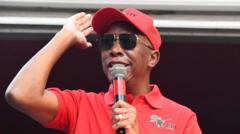The suspension of South African Police Minister Senzo Mchunu marks a crucial moment for President Cyril Ramaphosa's administration, as allegations of shielding criminal figures create significant pressure. The newly formed commission will investigate potential corruption within law enforcement, exposing deep-rooted issues in the justice system.
South Africa's President Initiates High-Stakes Corruption Inquiry into Police Chief

South Africa's President Initiates High-Stakes Corruption Inquiry into Police Chief
President Cyril Ramaphosa suspends police minister Senzo Mchunu amid serious corruption allegations, unveiling a commission to investigate ties with organized crime.
In a move aimed at addressing rising political pressure, South African President Cyril Ramaphosa announced on Sunday the suspension of Police Minister Senzo Mchunu, amid serious allegations of corruption and complicity within the country's law enforcement. Mchunu is accused of protecting associates connected to a criminal syndicate responsible for several high-profile murders.
The allegations were brought to light by Lt. Gen. Nhlanhla Mkhwanazi, the provincial police chief of KwaZulu-Natal, who claimed that Mchunu had disbanded a unit designed to investigate political assassinations, ostensibly to shield influential figures from scrutiny. These figures reportedly include politicians, judiciary members, and law enforcement officials entangled with the syndicate.
In response to these claims, which have escalated concerns among members of the governing coalition, Ramaphosa stated that a commission would be established to investigate not only the accusations against Mchunu but also potential infiltration of criminal networks within law enforcement, intelligence, and the judicial system itself.
The inquiry comes at a critical juncture for Ramaphosa’s government, as it grapples with allegations of corruption that threaten to destabilize a coalition formed a year ago amid great expectations. With mounting pressure from the Democratic Alliance, the second-largest party in the coalition, Ramaphosa emphasized the need for transparency, accountability, and commitment to the rule of law.
As this political crisis unfolds, many are questioning the effectiveness of the government's responses to corruption and the integrity of South Africa’s institutions. Ramaphosa’s administration faces a pivotal challenge in restoring public confidence while navigating political dissent and ensuring that justice is served.


















